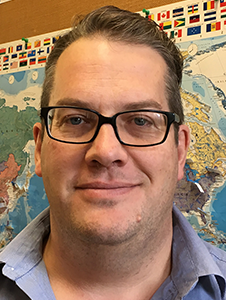 Dr Charles Shaw
Dr Charles Shaw
Charles Shaw shares how his background in mechanical engineering not only led to his PhD in Biochemistry, but also complemented his research.
Dr Shaw grew up in Dunedin, has a family and home and two adult children based here (with one of them studying at the University), and enjoyed his previous studies at the University so much that he felt it was the “obvious choice” for his PhD research.
"I realised many years ago that further study was necessary to progress in my career as a design engineer. The decision to undertake a Bachelor of Science at the University of Otago, rather than a Bachelor of Engineering elsewhere, was largely dictated by my family commitments in Dunedin.
“I majored in mathematics and physics, and particularly enjoyed electronics papers incorporated in the latter, taught in my time by Associate Professor Neil Thomson. He was a particularly inspiring teacher who was instrumental in my decision to undertake a master's in this topic.”
Dr Shaw's master's and doctorate studies were interspersed with periods of teaching and self-employment and, for one period after his master's, he was contracted to develop an electronic monitoring system for use in agriculture where he worked closely with Dr Stephen Sowerby.
Dr Sowerby would later go on to become one of his PhD supervisors, teaching Dr Shaw to focus on developing technologies to suit a specific customer need, “because many inventors get this backwards; developing technology and then failing to find a market for it”.
“Dr Sowerby came to me with an idea for a rapid Point-Of-Care (POC) diagnostic system for tuberculosis (TB), something which was urgently needed in poorly resourced communities to help combat the global TB epidemic, responsible for killing 1.5 million people in 2020,” Dr Shaw says.
“We developed a rudimentary prototype to demonstrate the concept's feasibility and received modest funding which would perhaps last for about six months.”
However, rather than working on this for six months, Dr Shaw was able to make this project the basis of his PhD and receive the supervisory support, laboratory space and stipend needed to work on the project for a further three years.
His thesis, “A New Method for the Detection of Biomolecules and its Application as a Point-of-Care Diagnostic for Tuberculosis”, acknowledges that TB is easily transmitted and so a rapid and reliable diagnostic system is essential to initiate the isolation, treatment and contact tracing required to control this global pandemic.
His research focused on the development of a molecular detection system which leveraged long-chain fatty acids as highly specific biological markers for TB.
“Complex laboratory systems exist for this purpose and so the project's key aim was to adapt these for use in a rapid, point-of-care diagnostic system that could be used by public health workers in poorly resourced communities,” Dr Shaw says. “A prototype system was designed and constructed and used to characterise a range of biological molecules.”
Dr Shaw is grateful to have had the opportunity to complete a PhD and for the University's support over this time. He particularly acknowledges his supervisors Professor Richard Macknight, Dr Stephen Sowerby and Professor Phillip Hill.
“They have provided a sounding board, helpful advice, and the freedom to chart my own path, and so I would recommend graduate study to any inventors out there who seek an opportunity to develop and commercialise their ideas,” Dr Shaw says.